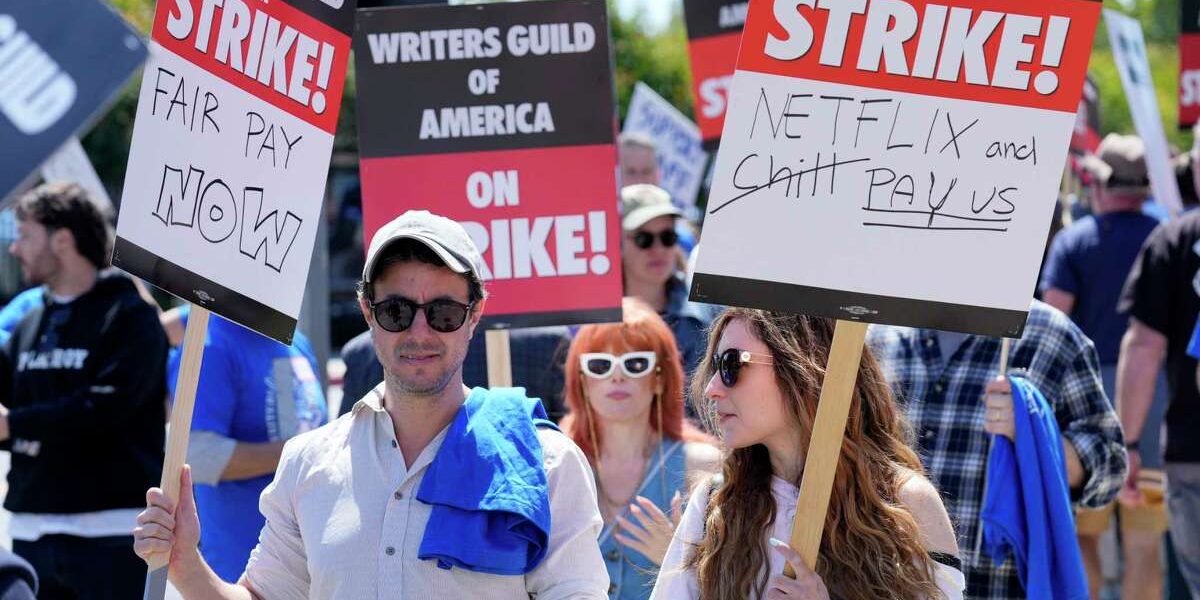Twelve thousand members of the Writers Guild of America (WGA) have walked off the job, striking against poor working conditions and dwindling remuneration packages that have left film and television writers behind as Hollywood rakes in millions through streaming services and other new forms of media consumption.
The WGA last went on strike in 2007, and since then, streaming has transformed the nature of television and movie production. An industry once dominated by large network broadcasters and a few studios has seen streaming services like Netflix and Amazon become powerhouses as ports of consumption and producing vast amounts of content. While legacy media companies like Disney and Paramount have tried to capitalize and joined the fray of streaming, the creative writing teams driving the success of television’s golden age have been left behind.
Writers’ issues
Television and film writers traditionally have made a significant portion of their incomes from residuals, income tied to airings after the original release of a show or movie. So every time a writer had a show they wrote rerun, sold on DVD or BlueRay or syndicated, they continued to receive income associated with that show. Streamers, however, pay significantly smaller residuals than the once-dominant networks and this has led to a steady decline of a major source of income for writers. If a show is removed from the streamer, the writers’ income from that show disappears. The WGA has calculated that their members have seen a four percent cut in pay over the last decade, or 23 percent when adjusted to inflation.
Writers have also acutely faced the cost of living crisis, with their livelihoods tied to living in the incredibly expensive metropolises their industry is based in, New York and Los Angeles. Writing jobs tend to be precarious at best, with writers often needing more work or between gigs. This has only worsened in the current work environment, where shows have shorter seasons, and writers are expected to produce in a more condensed schedule.
WGA demands
WGA has set out a pattern of demands aimed at addressing the problems their members are facing, pushing back against gig-ifying of their craft. These include increases to the minimum compensation for writing across all forms of television, a standardized compensation and residual model that covers film features, whether released theatrically or on streamers, and protections from abusive work environments. In addition, the WGA has pushed to disallow the use of AI in writing, knowing full well that profit-hungry studio executives will try to manipulate new technologies to reduce writer costs, irrespective if the quality of the product declines.
This strike has had the immediate effect of shutting down or curtailing significant sections of the entertainment industry, especially live shows like Saturday Night Live and nighttime talk shows, that are dependent on writing staff putting together new material on a daily or weekly business. But the producers and executives may feel less pressure to settle quickly when they can use writing that has already been produced for shows.
Solidarity can defeat the studio bosses
In this context, strong solidarity across the industry is a must. Many well-known actors and front-end talent have come out supporting writers and their demands. Celebrity sightings on the picket line have been common in the first few days of the strike. Funny picket signs threatening to spoil the hit show Succession were all over social media. However, how fast the strike will eat into the profits of the system is also key. If producers feel the eventual lack of scripts will cut into their streaming monies, the demands of the WGA may appear more palatable.
Like many before, this strike is a reflection of capital always looking for new ways to exploit its workers, create more profit streams, and not caring about the lives or creative talents of the people that produce the product millions watch on television and in theatres. A WGA victory is significant for those in the creative arts because it pushes against an ugly production model and helps ensure that those in the arts can earn a living making the shows and movies we all love to see.
Did you like this article? Help us produce more like it by donating $1, $2, or $5. Donate

